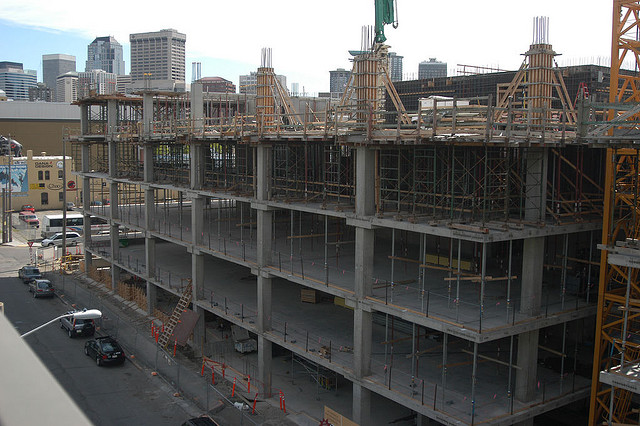
In a previous post we established a few important points. First, the housing market isn’t a solution to be accepted or thrown out but rather a tool we get to design. In many cities, the market is designed very poorly, including in Seattle. The best way to approach how the housing market should work is to first establish goals.
Make Housing Costs Our Most Important Priority
Most cities have development goals. Goals are a reflection of community input and are value statements. Seattle has many goals but one of the most prominent is maintaining neighborhood character. Seattle’s comprehensive plan explicitly endorses the value of maintaining neighborhood character, putting this on a pedestal compared to other needs. Most people would agree that this seems like an important goal but this isn’t most residents’ top priority. In fact, for many residents this is completely unimportant. The Urbanist strongly believes housing cost should be the most important priority when considering development in residential zones. This goal benefits nearly everyone, directly addresses a real crisis and can be measured. Furthermore, all city policies should be examined to determine whether they increase or decrease the cost of housing.
Understanding A Housing Price Problem Versus an Income Crisis
To begin talking about the housing cost problem, it is necessary to point out that we are really tackling two separate but connected issues.
- Sufficient income to pay for housing
- Prices that reflect the cost of providing housing
To illustrate the difference, imagine someone with no income. Even if rent were minimal, maybe $10 dollars a month, they still wouldn’t be able to afford it. Instead of approaching builders, owners or developers to reduce their price, we would likely provide income or subsidies for the housing.
Conversely, if everyone in the city had enough income to pay for housing but we all paid $10,000 a month in rent, while the cost of providing that housing was only $10 a month, we would have a price problem. In this situation, we would seek to understand why the price was so high and what we could do to bring that down.
In Seattle we have both an income crisis and a price problem.
Addressing The Income Crisis
There are many people who work full time and cannot afford housing. No one working full time should need subsidies. A market in which people need subsidies while working full time is not providing adequate wages. We need to reject subsidizing businesses that refuse to pay livable wages. Seattle is already on track to address this issue. If the $15 minimum wage law is passed it would help immensely to solve the income crisis, making many units in the private market affordable to individuals who couldn’t previously afford them.
Additionally, many of the homeless fall into the category of not having enough income for housing. Shelter is a human right and the government must step in to meet this need. This will be accomplished in many different ways but all methods will require funding. We need to support increased funding to end homelessness and ensure universal shelter.
Solving The Price Problem
In nearly all cities the price of housing is higher than it should be. A price problem can occur for many reasons and a few of those play out in cities. Fortunately, we can design a market in which someone making minimum wage can find affordable housing in the neighborhood they choose. A few tweaks to the market would change this almost immediately. One important method to begin solving the price problem is making it easier for people to move.
Make It Much Easier For People To Move
The ability to move gives those who need housing much more power. It is hugely important because it allows people to:
- reject rent increases by choosing somewhere different (putting downward pressure on prices)
- escape bad landlords (raising the standard for all landlords)
- choose safe and high quality places to live (increasing housing quality)
- choose areas that offer economic opportunity (increasing equity and social justice)
There are a few things that can be done to make moving easier. First, the Washington Tenant’s Union worked very hard with legislators to get relocation assistance into law and deserves to be applauded. This legislation needs improvement and the TU is working to make it even better. Relocation assistance is instrumental to mitigate the hidden cost of moving, such as inaccessible security deposits, time and hassle. More needs to be done to strengthen this law and you can support the Tenant’s Union in their efforts.
Second, there must be more available housing. Too many people competing for too few places results in neighbors and friends without housing. Imagine how this happens in Seattle. If two people want the same apartment, the landlord can raise the rent until one person gives up. In fact, as long as people want to live in a neighborhood and can’t choose another cheaper place, rents will rise. As rents go up in a neighborhood, we reduce the number of people who can move to that neighborhood. The only way to bring rents back down is for there to be more units. These units don’t even need to be cheaper than existing units (but it’s great if they are).
Strangely enough, arguments for more housing always raise intense objections. These often follow the lines that more housing is a push by special interest and libertarian ideologues. If we acknowledge that more housing can reduce prices and that that is our most important priority, it doesn’t matter if libertarians and special interests are making this argument. Furthermore, this attack is a harmful misunderstanding and misdirection, mostly made by anti-housing groups. The Urbanist, like many other pro-housing groups, would be excited if Seattle city government decided to build 10,000 housing units. We would also be thrilled if there were more subsidies for non-profits to build housing. Neither of these outcomes are libertarian utopias. The Urbanist acknowledges that neither the city nor non-profits are going to build the units needed right now. The private market is the only way to provide more housing right now. As much as I hate to say it, it’s possible for developers to pursue their own greedy interest while also doing something good for the city.
The Outcome We Want From The Housing Market
The housing market will not produce the outcomes we want until it is driven by a value we all share. We need to make housing costs our top priority. Once we’ve done this we need to work to increase subsidies for people that can’t afford rent, increase the number of affordable units, and make it easier to move. All of this is directly tied to providing more housing. We purposely designed our city to maintain neighbor character, preventing enough housing from being built. The result has been segregated neighborhoods, low mobility, rising rents and homelessness. We need to stop blaming the market and start admitting that we blew it. It’s time to design a market that works and build enough housing for everyone.

Owen Pickford
Owen is a solutions engineer for a software company. He has an amateur interest in urban policy, focusing on housing. His primary mode is a bicycle but isn't ashamed of riding down the hill and taking the bus back up. Feel free to tweet at him: @pickovven.


